- Regulatory Status
- RUO
- Other Names
- hMAdCAM-1, MACAM1, MAdCAM1, MAdCAM-1, mucosal addressin cell adhesion molecule 1, mucosal addressin cell adhesion molecule-1, mucosal vascular addressin cell adhesion molecule 1
- Ave. Rating
- Submit a Review
- Product Citations
- publications
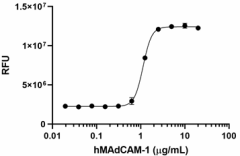
-

Immobilized recombinant human MAdCAM-1 supports the adhesion of HuT78 cells in a dose-dependent manner with ED50 range of 0.4 - 2.4 µg/mL in the presence of 1mM MnCl2. Deep Blue Cell Viability™ Kit (Cat. No. 424702) was used to detect the adherent cells. -

Recombinant human MAdCAM-1 was aliquoted in PBS at 0.2 mg/mL. One aliquot was frozen and thawed four times (4x Freeze/Thaw), and compared to a control kept at 4°C (Control). The samples were tested in an adhesion assay with HuT78 cells. The ED50 for this effect is 0.4 - 2.4 µg/mL in the presence of 1mM MnCl2.
| Cat # | Size | Price | Quantity Check Availability | Save | ||
|---|---|---|---|---|---|---|
| 797904 | 25 µg | £110 | ||||
| 797906 | 100 µg | £288 | ||||
MAdCAM-1 (Mucosal Addressin Cell Adhesion Molecule-1) is a 58-66 kD type I glycoprotein. MAdCAM-1 is a member of the immunoglobulin (Ig) superfamily, composed of extracellular domain with two Ig-like domains, followed by a transmembrane domain and a short cytoplasmatic domain. Human MAdCAM-1 is widely expressed after embryonic week 7. After birth, MAdCAM-1 is gradually expressed on gut-associated mucosal tissue. In adults, MAdCAM-1 is predominately expressed on High Endothelial Venule (HEV) of Peyer's patches, mesenteric lymph nodes and gut lamina propria. It is additionally expressed on vascular endothelium in mammary glands and pancreas, thymic medulla, tonsils, nasal associated lymphoid tissues, and brain. The integrin α4β7, expressed on lymphocytes, is the receptor for MAdCAM-1. The interaction of MAdCAM-1 to α4β7 via its N-terminal Ig-like domain plays a role in promoting intestinal inflammation. MAdCAM-1 is involved in lymphocyte tethering, rolling, and homing through its interaction with integrin α4β7 or CD62L. Besides, the ligation of lymphocyte ligand, CCR9 by chemokine CCL25 activates α4β7 binding to MAdCAM-1 promoting recruitment of lymphocytes to the small bowel. MAdCAM-1 is also expressed in minute amounts in healthy liver and upregulates inflammation in association with portal tract. Pro-inflammatory cytokines like TNF-α drive increased expression of MAdCAM-1. It has been reported that immobilized MAdCAM-1 is able to co-stimulate T cell proliferation. MECA-367 antibody blocks the interaction of MAdCAM-1 with its counter-receptor both in vitro and in vivo. In vivo administration of the mAb is able to reduce T-cell mediated inflammation in some gastrointestinal diseases. Upregulation of MAdCAM-1 has also been observed in several chronic inflammatory diseases, such as inflammatory bowel disease (IBD), diabetes, primary sclerosing cholangitis, liver cirrhosis, chronic relapsing experimental autoimmune encephalomyelitis. MAdCAM-1 could be a potentially useful marker to monitor disease activity.
Product DetailsProduct Details
- Source
- Human MadCAM-1, amino acid Gln19 – Gln317 (Accession # Q13477.2), with a linker (GSSR) and a C-terminal human IgG (Pro100-Lys330), was expressed in 293E cells.
- Molecular Mass
- The 534 amino acid recombinant protein has a predicted molecular mass of approximately 57.7 kD. The DTT-reduced and non-reduced protein shall migrate at 75-85 kD and 130-160 kD by SDS-PAGE, respectively. The predicted N-terminal amino acid is Gln.
- Purity
- >95%, as determined by Coomassie stained SDS-PAGE.
- Formulation
- 0.22 µm filtered protein solution is in PBS.
- Endotoxin Level
- Less than 0.1 EU per µg cytokine as determined by the LAL method.
- Concentration
- 25 µg size is bottled at 200 µg/mL. 100 µg size and larger sizes are lot-specific and bottled at the concentration indicated on the vial. To obtain lot-specific concentration and expiration, please enter the lot number in our Certificate of Analysis online tool.
- Storage & Handling
- Unopened vial can be stored between 2°C and 8°C for up to 2 weeks, at -20°C for up to six months, or at -70°C or colder until the expiration date. For maximum results, quick spin vial prior to opening. The protein can be aliquoted and stored at -20°C or colder. Stock solutions can also be prepared at 50 - 100 µg/mL in appropriate sterile buffer, carrier protein such as 0.2 - 1% BSA or HSA can be added when preparing the stock solution. Aliquots can be stored between 2°C and 8°C for up to one week and stored at -20°C or colder for up to 3 months. Avoid repeated freeze/thaw cycles.
- Activity
- Immobilized recombinant human MAdCAM-1 supports the adhesion of HuT78 cells in a dose-dependent manner with ED50 range of 0.4 – 2.4 µg/mL in the presence of 1mM MnCl2. Deep Blue Cell Viability™ Kit (Cat. No. 424702) was used to detect the adherent cells.
- Application
-
Bioassay
- Application Notes
-
BioLegend carrier-free recombinant proteins provided in liquid format are shipped on blue-ice. Our comparison testing data indicates that when handled and stored as recommended, the liquid format has equal or better stability and shelf-life compared to commercially available lyophilized proteins after reconstitution. Our liquid proteins are validated in-house to maintain activity after shipping on blue ice and are backed by our 100% satisfaction guarantee. If you have any concerns, contact us at tech@biolegend.com.
Antigen Details
- Structure
- Disulfide-linked homodimer
- Distribution
-
Different gastrointestinal tissues, such as high endothelial venule (HEV) of Peyer's patches, mesenteric lymph nodes and gut lamina propria
- Function
- Lymphocyte tethering, rolling and homing, costimulate T cell proliferatioon
- Interaction
- Circulating lymphocytes
- Ligand/Receptor
- Integrin a4ß7, CD62L
- Bioactivity
- hMAdCAM-1 support HuT78 cell adhesion in the presence of 1mM MnCl2
- Cell Type
- Endothelial cells, T cells
- Biology Area
- Cell Adhesion, Costimulatory Molecules, Immunology, Neuroinflammation
- Molecular Family
- Adhesion Molecules, Fc Receptors
- Antigen References
-
- Streeter PR, et al. 1988. Nature. 331:41-6.
- Briskin MJ, et al. 1993. Nature. 363:461-4.
- Berlin C, et al. 1993. Cell. 74:185-95.
- Lehnert K, et al. 1998. Eur J Immunol. 28:3605-15.
- Picarella D, et al. 1997. J Immunol. 158:2099-106.
- Gorfu G, et al. 2009. Curr Mol Med. 9:836-50.
- Briskin M, et al. 1997. Am J Pathol. 151:97-110.
- Eksteen B, et al. 2004. J Exp Med. 200:1511-7.
- Connor EM, et al. 1999. J Leukoc Biol. 65:349-55.
- Gene ID
- 8174 View all products for this Gene ID
- UniProt
- View information about MAdCAM-1 on UniProt.org
Related FAQs
- Why choose BioLegend recombinant proteins?
-
• Each lot of product is quality-tested for bioactivity as indicated on the data sheet.
• Greater than 95% Purity or higher, tested on every lot of product.
• 100% Satisfaction Guarantee for quality performance, stability, and consistency.
• Ready-to-use liquid format saves time and reduces challenges associated with reconstitution.
• Bulk and customization available. Contact us.
• Learn more about our Recombinant Proteins. - How does the activity of your recombinant proteins compare to competitors?
-
We quality control each and every lot of recombinant protein. Not only do we check its bioactivity, but we also compare it against other commercially available recombinant proteins. We make sure each recombinant protein’s activity is at least as good as or better than the competition’s. In order to provide you with the best possible product, we ensure that our testing process is rigorous and thorough. If you’re curious and eager to make the switch to BioLegend recombinants, contact your sales representative today!
- What is the specific activity or ED50 of my recombinant protein?
-
The specific activity range of the protein is indicated on the product datasheets. Because the exact activity values on a per unit basis can largely fluctuate depending on a number of factors, including the nature of the assay, cell density, age of cells/passage number, culture media used, and end user technique, the specific activity is best defined as a range and we guarantee the specific activity of all our lots will be within the range indicated on the datasheet. Please note this only applies to recombinants labeled for use in bioassays. ELISA standard recombinant proteins are not recommended for bioassay usage as they are not tested for these applications.
- Have your recombinants been tested for stability?
-
Our testing shows that the recombinant proteins are able to withstand room temperature for a week without losing activity. In addition the recombinant proteins were also found to withstand four cycles of freeze and thaw without losing activity.
- Does specific activity of a recombinant protein vary between lots?
-
Specific activity will vary for each lot and for the type of experiment that is done to validate it, but all passed lots will have activity within the established ED50 range for the product and we guarantee that our products will have lot-to-lot consistency. Please conduct an experiment-specific validation to find the optimal ED50 for your system.
- How do you convert activity as an ED50 in ng/ml to a specific activity in Units/mg?
-
Use formula Specific activity (Units/mg) = 10^6/ ED50 (ng/mL)

 Login / Register
Login / Register 





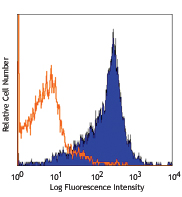
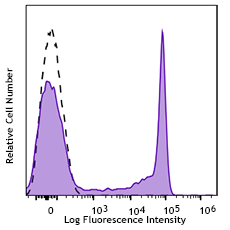
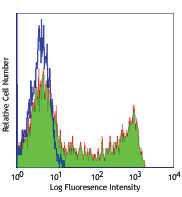
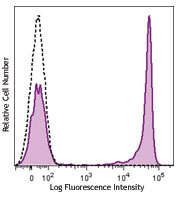



Follow Us